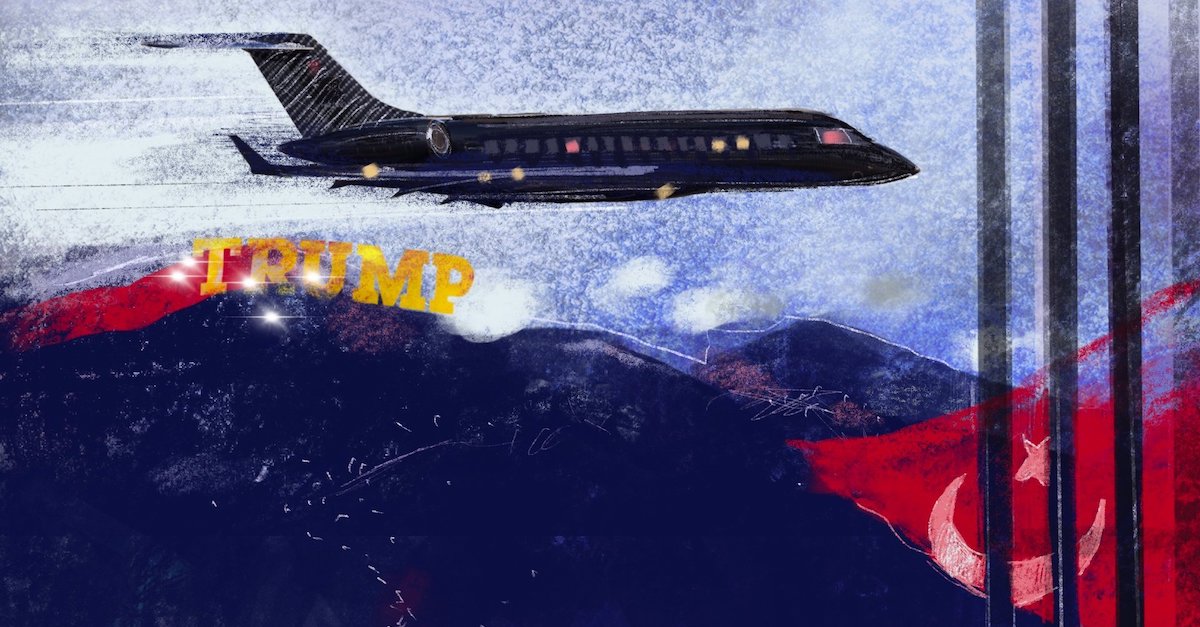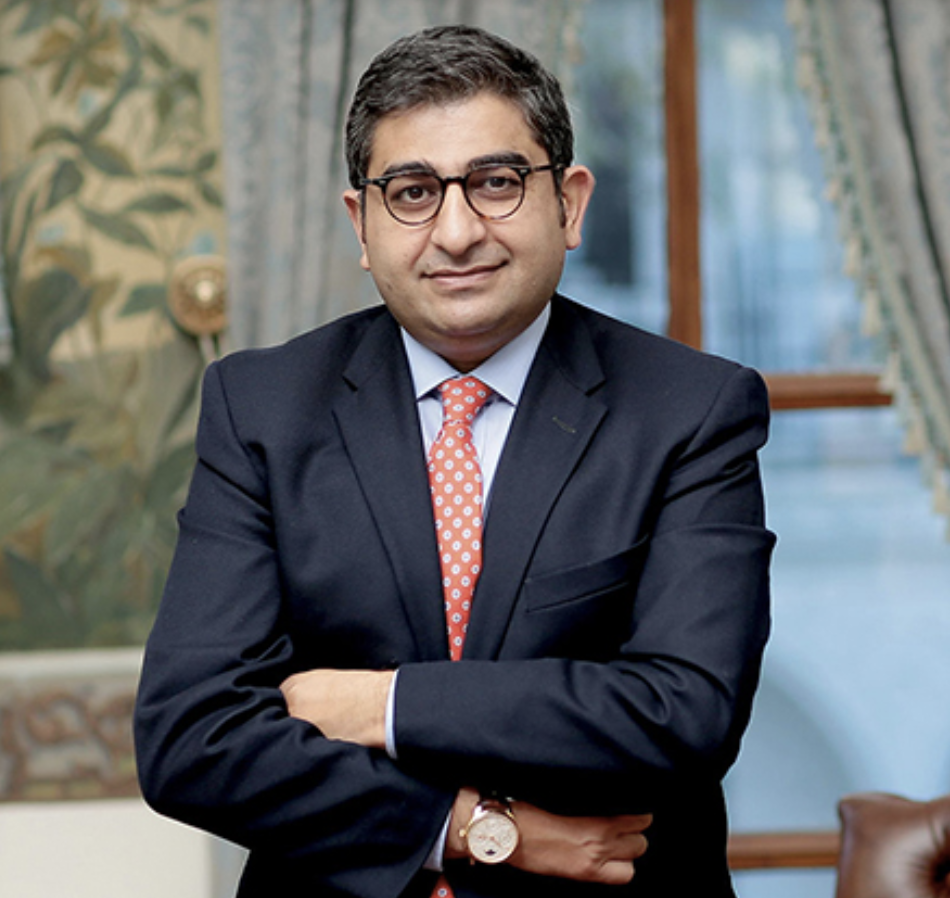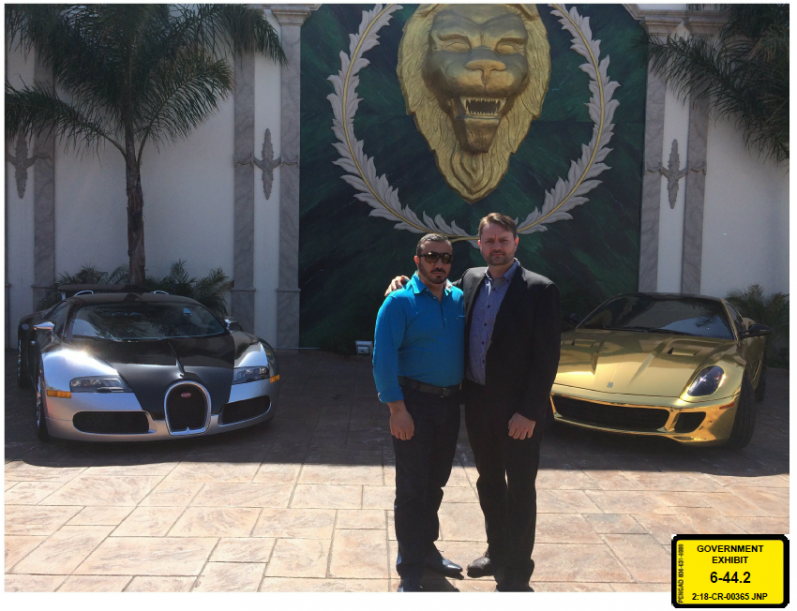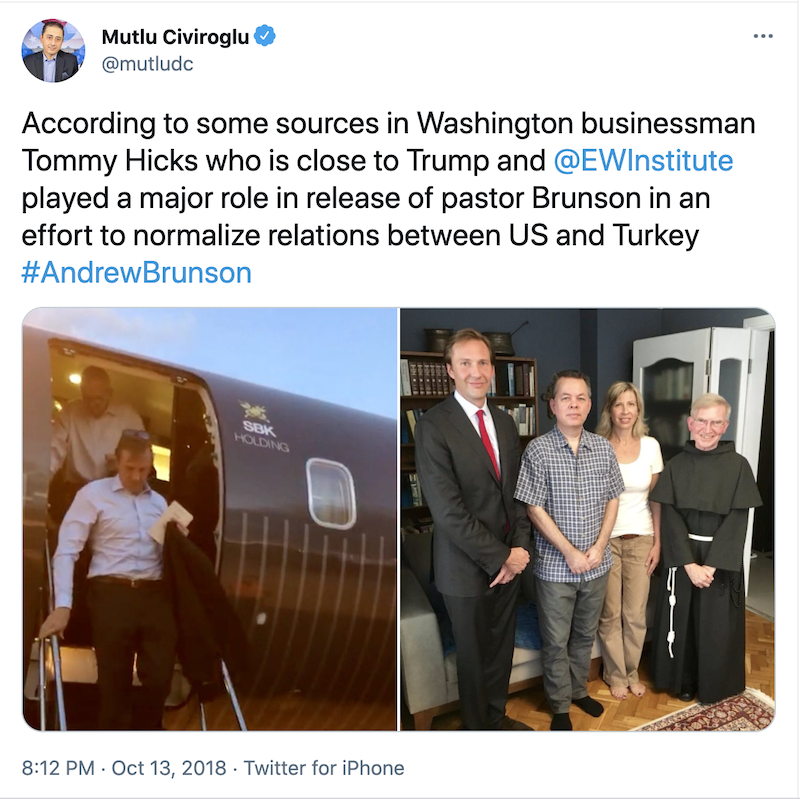
Illustration courtesy of artist Svetlana Tiourina
On September 18, 2018, a sleek, graphite-black private jet glided down from the stratosphere towards Izmir, an ancient harbor city on Turkey’s Aegean Coast.
On board was a motley group of Americans on a mission to free Andrew Brunson, a U.S. evangelical pastor imprisoned since 2016 on terrorism charges. Among them were Jim Woolsey, a former CIA director, and Tommy Hicks Jr., a top fundraiser for then-U.S. President Donald Trump. Seated alongside them in a black friar’s habit was Father James McCurry, a Franciscan priest.
The Americans’ host was the jet’s owner, Sezgin Baran Korkmaz, a flashy Turkish businessman who had publicly rubbed shoulders with Turkey’s president, Recep Tayyip Erdoğan. The businessman had recently burst into U.S. public life as a multi-million-dollar philanthropist and a player in Turkish efforts to curry favor in Trump’s Washington.
But what the Americans say they didn’t know was that Korkmaz was entangled in a fraud case involving a Mormon fundamentalist sect, Armenian-American organized crime, and the theft of half a billion dollars from the U.S. government.
Just weeks before the trip, U.S. prosecutors had arrested Korkmaz’s business partners over the half-billion-dollar fraud scheme. They have since alleged that many parts of Korkmaz’s business empire — including the jet that carried the Americans — were financed by the fraud, which involved claiming tax credits from the U.S. government for biofuel that was never produced.
Korkmaz is accused of helping the group move over $130 million from this fraud to companies and accounts in Luxembourg and Turkey, where he and the Americans had allegedly cultivated ties with senior government figures, even holding a meeting with Erdoğan himself.
The trip to free Brunson was just one of several backchannels, previously revealed by the European-based investigative journalism collective Organized Crime and Corruption Reporting Project (OCCRP) and partners, in which an international network of businessmen — many of them since embroiled in organized crime investigations and trials — served as intermediaries between Erdoğan’s authoritarian government and Trump’s Washington.
U.S. prosecutors are now seeking to seize millions of dollars from Korkmaz. The businessman is on the run abroad from Turkish authorities, who are also seeking his arrest in their own case.
Erdoğan, meanwhile, has attempted to hide any evidence of a connection with Korkmaz. Late last year, he obtained a Turkish court order to scrub all photographs of the two men together from the internet.
OCCRP and Law&Crime reconstructed the backchannel trip to free Brunson by interviewing multiple participants, and reviewing contemporaneous media reports and flight tracking data. The trip occurred just one month before Turkey released Brunson.
It is unclear if the mission played a role in securing the pastor’s freedom, but it does shed light on the alliances between an international cast of players that were a mainstay of backchannel diplomacy during the Trump administration. Korkmaz was just one of a slew of businessmen with alleged ties to transnational crime who managed to ingratiate themselves with members of Trump’s circle.
‘Last Act of Goodwill’
The 2018 journey was the brainchild of Nancye Miller, a businesswoman and lobbyist married to Woolsey, the former CIA director. Miller was suffering from terminal cancer at the time and died in March the following year.
For nearly two years, the detention of Brunson had become a major sore point in U.S.-Turkey relations. In July 2016, Erdoğan narrowly escaped an attempted military coup in which over 250 people died. Brunson, who ran a small storefront church in Izmir, was swept up in the ensuing crackdown, which saw thousands of people purged from the government and imprisoned on terrorism charges after being accused of ties to the movement of Fethullah Gülen, an exiled cleric blamed for orchestrating the coup.
Locked away on espionage and terrorism charges, Brunson soon became a cause celebre for Christians worldwide, including conservative U.S. evangelicals who are a key base of support for Trump.
But in spite of a warm personal relationship between Trump and Erdoğan — so warm that it prompted dismay among some of the U.S. president’s advisers — Brunson’s detention remained unresolved. In August 2018, the U.S. sanctioned senior Turkish officials over their role in Brunson’s prosecution and raised tariffs on Turkish steel imports. Turkey’s economy went into a tailspin.
Amid the crisis, Miller decided to put together a private mission to save Brunson. Over several months, she laid the groundwork, in collaboration with Korkmaz.
According to former CIA director Woolsey, the trip was intended to signal to Turkey that Brunson’s release would generate goodwill in the United States.
“I think [Nancye] wanted to show that there were major elements of society and government in the U.S. that were supporting this. We had a businessperson [Hicks]; we had me, a former government official,” Woolsey said in an interview.
Miller had originally intended to travel to Turkey herself, but bowed out due to her illness, sending Father McCurry, the Franciscan priest, in her stead. The trip was made without coordinating with the local Franciscans, McCurry said.
“Nancye was a very spiritual woman, and she said to me, she said: ‘You know, this may be the last act of goodwill that I may be able to do in my life and if I can play some role in helping to get Pastor Brunson released I’d offer my life for that’,” he said.
Hicks and Brunson did not respond to requests for comment.
In mid-September 2018, Miller’s handpicked group — including Woolsey, Hicks, and McCurry — flew to Istanbul, where Korkmaz played host. They checked into a hotel and waited for instructions.
Mormons, Organized Crime, and a Massive Tax Fraud
Korkmaz was a man who both Miller and Woolsey had known for some time, and he seemed well connected. Those connections, it turned out, included both Erdoğan’s government and transnational crime.
A previously obscure businessman with roots in Turkey’s impoverished east, the short and bespectacled Korkmaz emerged as a public figure in the United States in the mid-2010s as a self-styled philanthropist and humanitarian with money to spare.

Sezgin Baran Korkmaz. (Credit: https://sbkv.org)
Korkmaz became a benefactor and board member of the EastWest Institute, a New York-based international relations think-tank. In 2015 he also made a public pledge to give $20 million to Relief International, an aid organization, to help displaced Syrians. The pledge earned him a formal dinner at New York City’s Harvard Club, at which the charity launched his namesake “Sezgin Baran Korkmaz Initiative for the Sake of Our Children.” The promised money, however, never materialized, a spokesman for Relief International, Andrew Rice, told OCCRP.
Korkmaz, who declined to comment for this story, also participated in Turkish efforts to influence the U.S. government. On September 20, 2016, amid the U.S. presidential election campaign, Korkmaz reportedly attended a meeting with Miller and Woolsey — then a Trump campaign adviser — in New York’s Peninsula Hotel. During the meeting, the U.S. power couple was said to have pitched a $10 million lobbying and public relations contract to help Turkey discredit Gülen, Erdoğan’s U.S.-based nemesis. The deal never went through.
Also at that meeting was Korkmaz’s acquaintance, Ekim Alptekin, a Turkish-Dutch businessman indicted by U.S. federal prosecutors in 2018 for acting as an illegal agent of the Turkish government, by working with Trump’s national security adviser, Ret. Gen. Michael Flynn, to run a smear campaign against Gülen. Just one day before, on September 19, Alptekin and senior Turkish officials had held a meeting with Flynn to discuss plans to have Gülen extradited to Turkey. Woolsey told the Wall Street Journal in 2017 that the talks included discussing “a covert step in the dead of night to whisk this guy away.”
By this time, U.S. prosecutors allege, Korkmaz had enriched himself by laundering abroad a significant portion of the proceeds of a half-billion-dollar tax fraud scheme.
That scheme was a collaborative effort between Jacob and Isaiah Kingston, Utah-based brothers from a fundamentalist Mormon sect often known as “The Order” and Lev Aslan Dermen, an Armenia-born Los Angeles organized crime figure who also went by the name Levon Termendzhyan.

Levon Termedzhyan (left) and Jacob Kingston. (Courtesy of the Justice Department)
All three men have since been convicted over the fraud, which saw them seek at least $1.1 billion in phony biofuel tax rebates and make off with over $500 million.
Using the money, the group bought homes and luxury cars and built an international network of money and influence that stretched from the U.S. to Luxembourg and Belize.
It was Turkey, however, where the group directed over $130 million in anticipation of possibly fleeing to the country. For years, Korkmaz cultivated a high-profile image for himself in Turkey and secured meetings with Erdoğan for the Kingstons, who were touted by official government announcements as major foreign investors. In a photograph posted on news sites that Erdoğan has since tried to take down, Jacob Kingston and Korkmaz can be seen posing with the Turkish president.
In addition to U.S. efforts to seize Korkmaz’s wealth, Turkish authorities have launched their own parallel money laundering probe, at one point detaining 11 of Korkmaz’s associates. Korkmaz has pledged to return to Turkey to clear his name, but has so far not done so.
A Short Visit
The mission to free Brunson came just weeks after U.S. law enforcement had arrested the Kingstons and Dermen.
The trip lasted about a week, and was largely anticlimactic. The visiting Americans mostly stayed inside their Istanbul hotel. Woolsey fell ill during the visit and was incapacitated for much of the time.
Meanwhile, back in the U.S., Miller worked the phones, staying in touch with Erdoğan’s office, McCurry recalled.
“Nancye, as I say, was coordinating everything,” McCurry said. “She was on the phone with [the Turkish government in the capital] Ankara and she was back and forth with her other business connections all the time. So even though she was too ill to travel, she was not too ill to be on the phone.”
İbrahim Kalın, a spokesman for Erdoğan, did not respond to questions sent by reporters.
The culmination of the visit was the September 18 trip from Istanbul to Izmir to visit Brunson at home, where he was confined. Korkmaz and Woolsey stayed aboard the private jet, while McCurry and Hicks ventured into town with Korkmaz’s lawyer.
Turkish media captured footage of Hicks and McCurry outside Brunson’s home. A photo from the meeting, as well as a blurry image appearing to show Hicks alighting from Korkmaz’s jet, were tweeted the following month by a Kurdish affairs analyst, Mutlu Civiroglu, but attracted little notice. Woolsey and Miller’s roles in the trip have never before been reported.

Pictures from the visit to Brunson in Izmir were posted to the Twitter account of Kurdish affairs analyst Mutlu Civiroglu, but few took notice. (Credit: Twitter, @mutludc)
Brunson did not respond to requests for an interview. But in his memoir, he described an unannounced visit by a Franciscan priest, a Turkish lawyer, and an unnamed “American businessman” who showed him “some pictures on his phone of him with various high-profile people in the U.S. government.”
The businessman — who reporters have established was Hicks — told Brunson, “We’re meeting with President Erdoğan tomorrow,” Brunson recalled. “We’re private, and represent relationships between businessmen in the U.S. and businessmen in Turkey. We all want to see this resolved and expect that it will be tomorrow and when it is we’d like to take you home.”
The promised resolution did not materialize. McCurry said the planned face-to-face meeting with Erdoğan also never occurred. Instead, he said, Miller was in touch with the Turkish president and his office by phone.
It is unclear if the group’s trip helped lead to Brunson’s release the following month.
In an interview, Brunson’s lawyer, Ismail Cem Halavurt, said the first he had heard of Korkmaz’s efforts was when the businessman contacted him a few days prior to the pastor’s release. On the day of the trial, Korkmaz requested that the lawyer publicly identify him as playing a key assisting role in getting Brunson released. Halavurt said he declined. But Korkmaz nonetheless turned up by Halavurt’s side — and in full view of the news cameras — as Brunson walked to freedom.
Father McCurry, meanwhile, said that Miller got back in touch with him while he was on a pilgrimage to Lourdes, a holy site in France, and asked him to record a message thanking Turkey for the pastor’s release, which he did.
“I am not sure what she did with it or who actually received it in Turkey, and I seriously doubt that it was ever played for anyone there,” he said.
“So I do not attach much importance to it, except that it is a sincere expression of thanks and hope.”